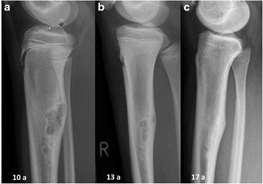Pediatric Bone Tumors in Delhi
Pediatric bone tumors are abnormal growths of cells within the bones of children and adolescents. These tumours can be benign (not cancerous) or malignant (cancerous) (cancerous).
Some of the most common types of pediatric bone tumors include osteosarcoma, Ewing's sarcoma, and chondrosarcoma. Osteosarcoma is the most common malignant bone tumor in children and adolescents, while Ewing's sarcoma is the second most common.

Pediatric bone tumors can have various causes and risk factors, including:
- Genetic mutations: Certain genetic mutations can increase the risk of developing bone tumors. Examples include hereditary retinoblastoma, Li-Fraumeni syndrome, and multiple osteochondromas.
- Family history: A family history of bone tumors can increase the risk of developing them.
- Radiation exposure: Exposure to ionizing radiation, such as during cancer treatment, can increase the risk of developing bone tumors later in life.
- Age: Certain bone tumors are more common in specific age groups. For example, Ewing sarcoma is most commonly diagnosed in children and young adults.
- Gender: Certain bone tumors are more common in males or females. For example, osteosarcoma is more common in males, while chondrosarcoma is more common in females.
- Bone disorders: Some bone disorders, such as Paget's disease and osteogenesis imperfecta, can increase the risk of developing bone tumors.
- Environmental factors: Exposure to certain environmental toxins, such as pesticides or chemicals, may increase the risk of developing bone tumors.
Pediatrics Bone Tumor Diagnosis
Pediatric bone tumors are usually diagnosed through a combination of medical history, physical examination, imaging tests, and biopsy. The diagnostic process usually involves the following steps:
- Medical history and physical examination: The doctor will ask questions about the patient's symptoms, medical history, and family history, and conduct a physical examination to look for any signs of a bone tumor, such as swelling or pain.
- Imaging tests: Imaging tests such as X-rays, MRI, CT scan, or bone scan can help to identify the location, size, and type of tumor.
- Biopsy: A biopsy is a procedure in which a small sample of tissue is taken from the suspected tumor and examined under a microscope to determine if it is cancerous or benign.
- Laboratory tests: Laboratory tests may be ordered to help diagnose and monitor the tumor, including blood tests, bone scans, and genetic testing.
Pediatric Bone Tumor Treatment
- Treatment of Pediatric Bone Tumors depends on the type of tumor, stage of the disease and site of tumor .
- In case of Osteosarcoma treatment is chemotherapy and surgery. Initial treatment is with chemotherapy followed by surgery and then further chemotherapy.
- Surgery is an important treatment modality in bone tumors. Goal of surgery is removal of the entire tumor with preservation of normal bone as much as possible.
- For Ewing’s sarcoma- treatment is chemotherapy followed by surgery and or radiation therapy and then maintenance chemotherapy.
For enquiries, bookings or support, call us at +91-96508 06846
Need help? Get a call back from our support team
Contact Us

